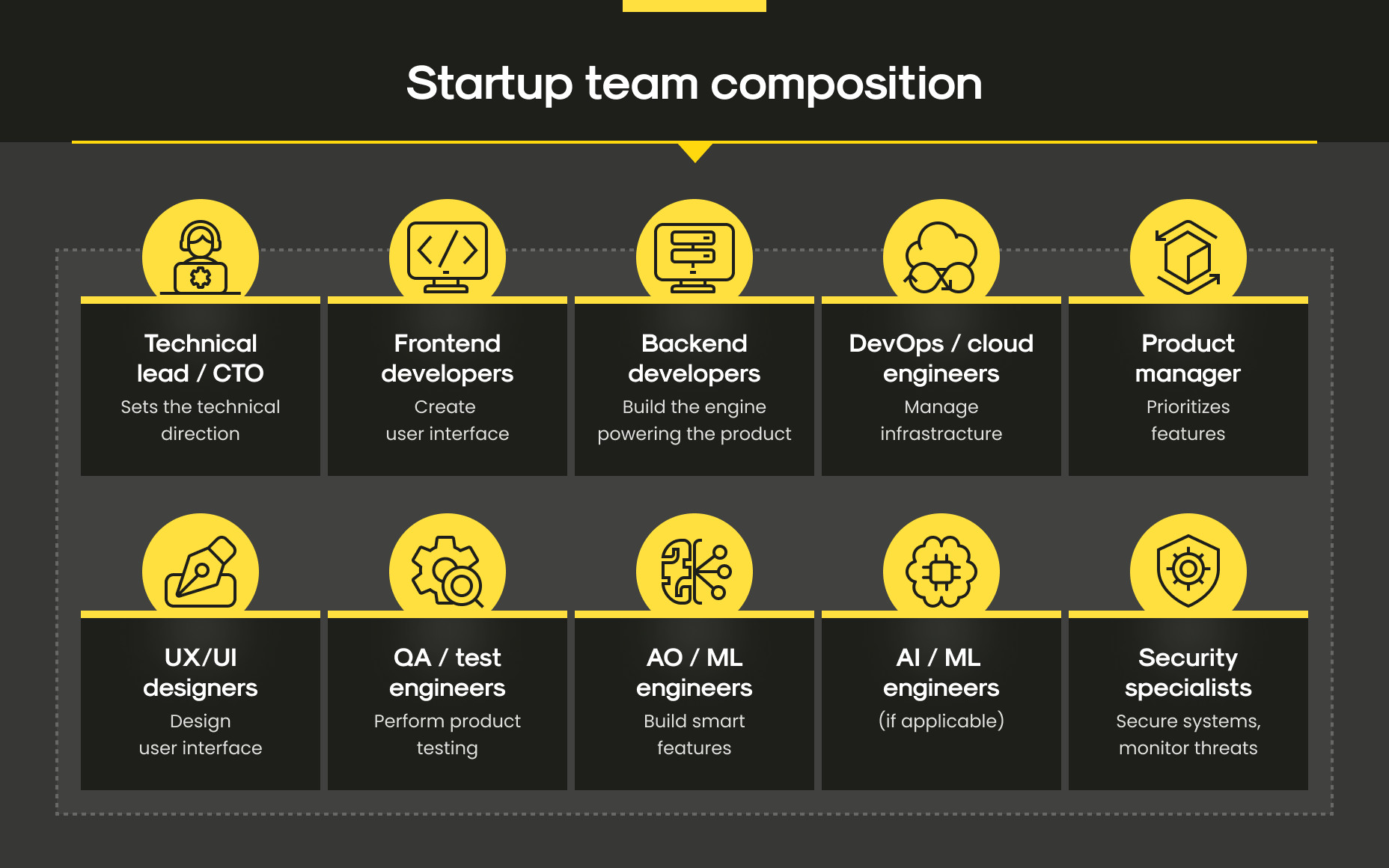In 2025, assembling the right tech team is one of the biggest challenges a startup founder can face. Bringing in skilled technical talent isn’t just a key decision; it’s often the most critical and expensive one on the entire journey.
In this article, you’ll learn:
- What makes a winning startup team,
- Which roles to prioritize,
- And how to spot the talent that will help turn your vision into reality.
Whether you’re just forming your core crew or looking to strengthen your current lineup, this guide’s got you covered.
Tech team composition
What does a winning startup tech team look like today? Here’s a breakdown of the key components that make up a well-rounded startup tech team:

Tech team composition
- Technical Lead / CTO
The one who sets the technical direction, makes architecture decisions, and ensures tech aligns with business goals. They’re part coder, part strategist.
- Backend developers
They build the engine that powers the product: from databases to APIs. Think of them as the behind-the-scenes architects of functionality.
- Frontend developers
These are the folks who bring your product to life visually. They create the interfaces users interact with, ensuring a smooth and engaging experience.
- DevOps / Cloud engineers
Talking about keeping the infrastructure running smoothly: they manage deployments, monitor systems, and automate processes for scalability and performance.
- Product manager
The bridge between business and tech. They prioritize features, gather user feedback, and make sure the team is building the right thing.
- UX/UI designers
Responsible for user experience and visual design. Their work ensures your product isn’t just functional, but intuitive and enjoyable.
- QA / test engineers
They hunt bugs before your users do. With automated and manual testing, they make sure your product ships stable and solid.
- AI/ML engineers (if applicable)
Increasingly common in modern startups, these specialists build smart features, train models, and integrate AI into your product.
- Security Specialists
They ensure data is safe, systems are secure, and your startup isn’t on the evening news for all the wrong reasons.
Key trends of 2025
If you plan to launch or scale your startup this year, understanding the key shifts in team structure, skills, and priorities is crucial. In this section, we’ll walk you through the most important trends shaping startup tech teams in 2025.
Leaner, smarter teams
Startups are opting for smaller, cross-functional teams that can move quickly and adapt on the fly. Rather than hiring for every possible role, companies are prioritizing generalists with strong problem-solving skills and startup experience. These “full-stack humans” can juggle frontend, backend, and even a bit of DevOps or AI integration. For instance, the concept of “vibe coding,” where AI assists in coding tasks, allows a team of 10 engineers to perform the work of 50 to 100, significantly enhancing productivity.
Fractional talent and remote-first models
The rise of fractional CTOs, part-time DevOps engineers, and freelance AI consultants is reshaping how startups build their teams. Flexibility is key, and that’s where models like team augmentation and dedicated teams come in. Startups want flexibility, and working with experienced professionals on a project basis helps reduce burn rate without sacrificing quality. Fully remote tech teams are now the default, with asynchronous workflows and a strong documentation culture to match.
Product and design take a front seat
In 2025, startups know that good tech isn’t enough. That’s why product managers and UX/UI designers are embedded early, often working alongside developers from day one to ensure alignment between tech capabilities and user needs.
DevOps and security built-in
Security is top priority, especially for startups working in fintech, healthtech, or data-heavy spaces. Cloud-native DevOps engineers with a security-first mindset are becoming core members of the team. Startups are investing early in infrastructure automation, monitoring, and compliance tooling.
AI engineers are no longer optional
With generative AI maturing and becoming embedded in everyday workflows, startups are increasingly adding ML/AI engineers early on. These specialists help build smarter products and leverage LLMs, NLP, and predictive models to drive automation and personalization.
Startup teams embrace AI tools
Beyond hiring AI engineers, entire dev teams are now leveraging AI copilots, auto-documentation tools, test generators, and smart debugging assistants. This boosts productivity, shortens development cycles, and allows teams to stay lean. A study by Index Ventures found that 50% of European tech startups see AI investments enabling them to hire more people, with another 29% expecting to maintain current workforce levels.
Soft skills are a hiring priority
With distributed teams and constant change, collaboration and communication have become non-negotiable. Startups increasingly look for engineers who can explain their ideas clearly, work well in cross-functional settings, and thrive in fast-moving environments.
Building a successful startup team in 2025 requires a strategic approach to assembling a group with the right skills, roles, and cultural fit to bring your vision to life. Here’s how to navigate this process:
The process of building a tech team
Figure out what your startup needs, and bring on people who get your vision and vibe. Let’s look at the steps to building a resilient and effective team.
- Define your vision and culture
Clearly articulate your company’s mission, values, and long-term objectives. This clarity ensures that potential team members align with your startup’s goals and fosters a cohesive work environment.
- Prioritize key roles
In the early stages, focus on filling positions that are critical to product development and market entry. Essential roles often include:
- Product manager. Oversees the product lifecycle, ensuring alignment with market needs.
- Technical Lead/CTO. Guides the technical direction and manages the development team.
- Marketing Lead. Develops strategies to build brand awareness and attract customers.
- Sales Lead. Drives revenue generation through customer acquisition and partnerships.
These roles create a balanced foundation, combining technical expertise with market-facing functions.
- Seek versatile and adaptable talent
Startups benefit from team members who can wear multiple hats and adapt to evolving responsibilities. Look for individuals with a broad skill set, problem-solving abilities, and a proactive mindset. Such versatility is invaluable in a dynamic startup environment.
- Emphasize cultural fit and soft skills
Beyond technical competencies, prioritize candidates who resonate with your company’s culture and values. Strong communication, collaboration, and resilience are crucial traits that contribute to a harmonious and productive team dynamic.
- Leverage strategic talent acquisition
Utilize modern recruitment tools and platforms to identify and attract top talent. Building relationships through networking events, industry conferences, and online communities also helps you connect with potential candidates.
- Offer competitive compensation and growth opportunities
While startups may have limited resources, offering equity, flexible work arrangements, and clear paths for professional development can make your company more attractive to prospective employees. Transparent communication about growth opportunities fosters loyalty and motivation.
- Foster continuous learning and development
Encourage a culture of ongoing education by providing access to training programs, workshops, and mentorship. This investment not only enhances your team’s skill set but also demonstrates a commitment to their professional growth.
Common mistakes in building a startup tech team
Here are some common mistakes founders often make when assembling a tech startup team, and a few tips to help dodge them like a pro:
Delaying key hires. Waiting too long to bring in a product manager, DevOps engineer, or security expert can bottleneck progress or lead to major issues down the line.
Going solo for too long. Trying to build everything alone (or with just one developer) slows you down. Building a product requires multiple perspectives: design, UX, frontend, backend, QA, and more.
Ignoring soft skills. Startups move fast, and communication is everything. Founders often underestimate the importance of hiring team members who are great communicators and problem-solvers.
Not defining clear roles. A team of talented individuals can still flounder without clear responsibilities. Make sure each team member knows their scope and how they contribute to the bigger picture.
Underinvesting in leadership. It’s tempting to postpone hiring experienced leadership (like, say, a CTO), but the lack of technical direction can lead to tech debt, missed deadlines, or messy architecture.
How Mitrix can help
We love working with startups as we like helping bold ideas take shape. Whether you’re at square one or scaling fast, we’re here to build, adapt, and grow with you. See how Mitrix can help you build the right team and bring your startup idea to life.
- MVP development to quickly test and validate your concept
- Team augmentation services for scaling fast with the right experts
- Dedicated development teams tailored to your project needs
- UI/UX design to craft intuitive, user-centric experiences
- AI/ML engineering to give your product a smart edge
- Full-cycle product development from idea to launch and beyond
Curious about how to assemble your startup team in 2025? Contact us today!
Wrapping it up
If you’re running a tech startup, your development team is the engine. They turn your vision into a working product, build the core functionality, and make sure every new feature actually works in the real world.
Building up the right tech team is about balance: blending technical chops with creativity, adaptability with focus, and vision with execution. Whether you’re still sketching your idea on a napkin or already pushing your first release, your team will make or break your journey. So stay flexible and don’t be afraid to bring in the right help when you need it.


